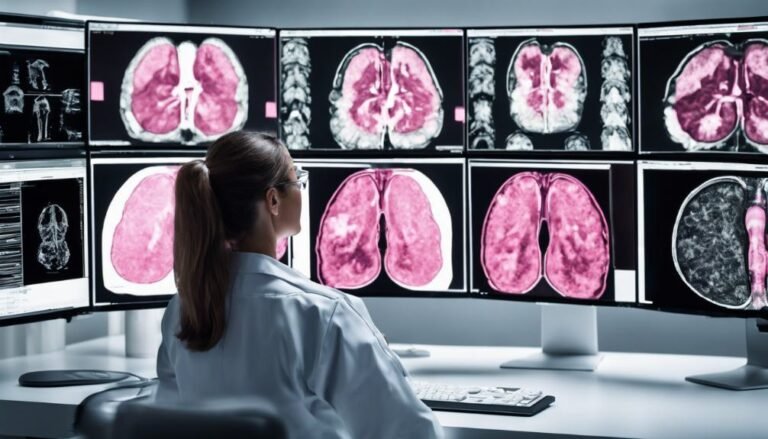AI for Health Information Exchange
In the domain of Health Information Exchange, AI emerges as a transformative force, reshaping how healthcare data is managed and shared. Imagine a world where AI seamlessly connects disparate systems, enhances data security, and empowers providers to deliver more personalized care. The potential of AI in revolutionizing HIE is vast, offering solutions to longstanding challenges and paving the way for a more efficient and interconnected healthcare ecosystem. As we explore the intersection of AI and HIE, the possibilities for improved patient outcomes and streamlined processes become increasingly intriguing.
Key Takeaways
- AI enhances interoperability by standardizing data formats.
- Automated data analysis optimizes HIE systems.
- AI boosts data security with advanced encryption.
- AI streamlines patient information sharing for care coordination.
- AI applications in care coordination improve patient outcomes.
The Importance of Health Information Exchange
Health Information Exchange (HIE) plays a crucial role in facilitating the secure and efficient sharing of patient data among healthcare providers, ultimately improving care coordination and patient outcomes. Data sharing is a cornerstone of HIE, allowing healthcare providers to access essential information about a patient's medical history, treatments, and test results. This seamless exchange of data enables physicians to make well-informed decisions promptly, leading to more effective treatments and improved patient care.
Information access is another critical aspect of HIE, ensuring that healthcare providers have timely access to relevant patient information regardless of the location where the data was originally captured. This accessibility streamlines communication between different healthcare entities, reducing duplication of tests and treatments, ultimately resulting in cost savings for both patients and healthcare providers.
Challenges in Current HIE Practices
The implementation of Health Information Exchange (HIE) faces notable challenges in current practices, particularly in guaranteeing seamless interoperability and data security across diverse healthcare systems. HIE challenges stem from data sharing difficulties, such as varying data formats, standards, and privacy concerns.
Current solutions to these challenges involve leveraging Artificial Intelligence (AI) technologies to enhance interoperability and data security in HIE practices. AI solutions can help standardize data formats, facilitate data mapping between different systems, and automate data validation processes to guarantee accuracy and consistency in shared information.
Additionally, AI algorithms can strengthen data security by implementing advanced encryption techniques, real-time threat detection, and access control mechanisms to safeguard sensitive patient information exchanged within HIE networks.
Role of AI in Enhancing HIE
AI plays a vital role in enhancing Health Information Exchange by improving data integration efficiency, ensuring that information flows seamlessly between different healthcare systems.
Through AI, interoperability is enhanced, enabling disparate systems to communicate and share data effectively, ultimately leading to better patient care coordination.
Additionally, AI facilitates automated data analysis, allowing for quick processing of vast amounts of healthcare information to derive valuable insights for healthcare providers.
Data Integration Efficiency
Data integration efficiency plays a pivotal role in enhancing Health Information Exchange by leveraging AI technologies to streamline and optimize data exchange processes. Through data integration automation, efficiency metrics can be established to track and improve the flow of information between different healthcare systems.
AI-driven data exchange enables real-time data sharing, reducing delays and errors in transmitting patient information. By automating the integration of diverse data sources, AI enhances data quality and completeness, ensuring that healthcare providers have access to thorough patient records when needed.
Process optimization through AI allows for the seamless exchange of information across various platforms, improving communication and decision-making in healthcare settings. Overall, AI's role in data integration efficiency is vital for enhancing Health Information Exchange by enabling faster, more accurate, and secure sharing of medical data among different healthcare entities.
Interoperability Enhancement Through AI
Enhancing Health Information Exchange through AI involves optimizing systems for seamless interoperability and data exchange. AI algorithms play a significant role in enhancing healthcare integration by enabling different systems to communicate effectively. These algorithms can interpret and standardize data formats, making it easier for disparate systems to share and understand information.
AI algorithms aid in mapping data elements across various platforms, ensuring that terminology and coding structures are consistent. By facilitating this standardization process, AI promotes better data interoperability, allowing healthcare organizations to exchange information accurately and efficiently.
Moreover, AI can automate data mapping tasks, reducing the manual effort required for integrating different systems. This automation not only speeds up the integration process but also minimizes the risk of errors that can occur during manual data mapping.
Automated Data Analysis
Utilizing advanced algorithms, the automated data analysis process plays a crucial role in optimizing Health Information Exchange (HIE) systems for seamless interoperability and efficient data exchange.
Through automated analysis, vast amounts of healthcare data can be efficiently processed, allowing for quicker identification of trends, anomalies, and critical insights.
AI-driven automated analysis tools can sift through diverse data sources, such as electronic health records and diagnostic reports, to extract valuable information that can enhance decision-making processes within HIE networks.
Improving Interoperability With AI
To improve interoperability with AI in health information exchange, focus on enhancing data integration and streamlining communication processes.
By leveraging AI technologies, you can facilitate seamless data exchange between different healthcare systems and providers.
This optimization can lead to more efficient workflows and better-informed decision-making in healthcare settings.
Enhancing Data Integration
Data integration in health information exchange can be greatly enhanced through the application of artificial intelligence (AI) algorithms. AI can greatly improve data accuracy by automating the process of matching and reconciling patient records across different systems. By leveraging AI capabilities such as machine learning and natural language processing, healthcare organizations can guarantee that information is correctly mapped and linked, reducing errors commonly associated with manual data integration.
Moreover, AI plays an essential role in enhancing information accessibility within health information exchange platforms. Through intelligent algorithms, data can be structured and standardized to guarantee seamless interoperability between disparate systems. AI can also assist in real-time data transformation, allowing healthcare providers to access relevant patient information efficiently.
Streamlining Communication Processes
Improving communication processes in health information exchange can be greatly streamlined through the strategic application of artificial intelligence (AI) technologies. By focusing on communication optimization and AI implementation, healthcare entities can enhance process efficiency and leverage technology advancement to guarantee seamless data exchange.
AI tools can be utilized to automate routine tasks such as data entry, retrieval, and analysis, reducing the burden on healthcare professionals and minimizing the risk of errors. Additionally, AI algorithms can prioritize and route information effectively, ensuring that critical data reaches the right individuals in a timely manner.
Through AI-driven solutions, organizations can establish standardized protocols for information exchange, allowing for interoperability among different systems and stakeholders. This standardization not only improves the speed and accuracy of communication but also enhances overall data security and compliance with regulatory requirements.
Enhancing Data Security With AI
By leveraging artificial intelligence (AI), healthcare organizations can greatly enhance their data security measures, ensuring the protection of sensitive patient information from potential breaches. AI plays an essential role in data encryption, providing advanced algorithms that can secure patient data both at rest and in transit. Through AI data encryption, healthcare providers can safeguard electronic health records (EHRs) and other critical information, making it considerably harder for unauthorized parties to access or decipher the data.
Moreover, AI contributes to enhancing privacy protection by monitoring access controls and detecting anomalies in data usage patterns. Machine learning algorithms can identify suspicious activities, such as unauthorized access attempts or unusual data transfers, triggering immediate alerts to IT security teams. This proactive approach strengthens overall data security and minimizes the risk of privacy breaches within healthcare systems.
Streamlining Patient Information Sharing
To optimize the efficiency of healthcare operations, implementing AI-driven solutions can revolutionize the process of sharing patient information securely and seamlessly.
Patient engagement plays a pivotal role in this streamlined approach, ensuring that individuals are active participants in the exchange of their health data. AI tools can facilitate this engagement by providing personalized portals where patients can access and contribute to their own information, promoting transparency and collaboration in the sharing process.
Moreover, data privacy is paramount when it comes to patient information sharing. AI technologies offer advanced encryption methods and secure data transfer protocols that safeguard sensitive health data from unauthorized access or breaches.
AI Applications in Care Coordination
AI plays a pivotal role in enhancing care coordination by leveraging advanced algorithms to streamline communication and information exchange among healthcare providers. Care coordination efficiency is greatly enhanced through AI applications that facilitate seamless collaboration between different healthcare teams involved in a patient's care.
By automating tasks such as appointment scheduling, referrals, and sharing patient updates, AI notably reduces the administrative burden on healthcare professionals, allowing them to focus more on delivering high-quality care.
One of the key AI benefits in care coordination is patient care optimization. Through predictive analytics and machine learning, AI can analyze vast amounts of data to identify patterns and trends that can help healthcare providers make more informed decisions about patient treatment plans.
This optimization leads to better outcomes for patients by ensuring that they receive timely and appropriate care tailored to their specific needs.
Impact of AI on Patient Outcomes
Enhancing care coordination through AI applications leads to improved patient outcomes by optimizing treatment plans and ensuring timely and tailored care delivery. Patient engagement plays an essential role in the success of AI algorithms designed to enhance patient outcomes.
AI algorithms can analyze vast amounts of patient data to identify patterns and predict potential health issues, enabling healthcare providers to intervene proactively.
Moreover, AI-driven machine learning strategies can improve treatment adherence by personalizing care plans based on individual patient characteristics and historical data. These strategies can help predict which patients are at higher risk of non-adherence and provide targeted interventions to support them.
Conclusion
To sum up, AI is the key to revealing the hidden treasures of health information exchange, like a master key opening doors to a wealth of data insights and streamlined communication.
By harnessing the power of artificial intelligence, healthcare organizations can navigate the complex maze of data integration, interoperability, and security with ease, ultimately paving the way for improved patient outcomes and personalized care delivery.
Embrace the AI revolution and watch as your healthcare ecosystem blossoms into a well-oiled machine of efficiency and innovation.







